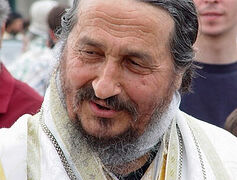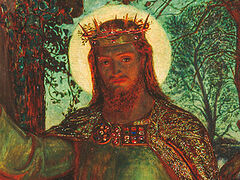Our Fast reaches an apex today. “Before I perish utterly, save me, O Lord.” These twenty-four penitential stichera were sung at Vespers. And tonight we have the Matins service, when we will hear the entire Great Canon of Repentance of St. Andrew of Crete. That which we heard in the first days of Lent is again offered to us to see whether we have achieved the repentance of the Church. As the journey approaches the end, we have to see where we’ve arrived. The Church warns that we can end up blind and deaf.
How many times I’ve heard in confession throughout my long priestly ministry, some babushka, standing before the Cross and Gospel, loudly says she has no sins at all, that she keeps the fast, prays, and does only good to everyone. And when the priest shouts: “What do you repent of, why have you come here?”—she answers: “I can’t hear. I’m deaf.” There’s no point in shouting. And if she’s also illiterate (it happens), then she can’t even write her sins. But if she was literate and could hear well, it would still be necessary to shout. The Church didn’t get through to her her whole life. She didn’t hear what was most important in life. What can be done now?
Christ says: “I came to save not the righteous, but sinners” (cf. Lk. 5:32). Because, why save the righteous?—they’re already saved. What is there to save them from—from righteousness? But inasmuch as Christ same to save everyone, all of mankind, it’s clear what kind of division occurs between people—who are the righteous and who the sinners. Therefore, the Church prays throughout Lent with the main Lenten prayer of St. Ephraim the Syrian, which is like the seal of all our prostrating prayers: “Lord, grant me to see my own sins.” We constantly recall the words of the saints, that it is greater to see your sins than to see angels. Why is it greater? Because to see your own sins means to begin to see what Christ does. It means distinguishing between good and evil at the depth where the Cross of Christ is to be found, where our salvation is revealed.
Christ is infinitely merciful. He is rich with the riches of Divine life. He has the fullness of life. And Scripture says He is also rich in mercy. But He does not enrich those who are rich, who think they already have everything. He doesn’t enlighten those who think they know everything and don’t need to be enlightened. He doesn’t reach out His hand to those who believe they firmly stand on their own feet—they neither stumble nor fall. The Lord doesn’t comfort those who think everything is fine without God. They have it good in this world—what other consolation do they need?
The Lord saves only those who realize that they’re in trouble, that they’re in sin, that they’re in despair, that they’re in a situation they’ll never get out of, no matter what they do. And no one will help him. There is no power that can help them, save the strength of God, and no mercy that could see and feel compassion, save His love. Thus, the prayer that we might see our own sins is the most important.
The holy Church also warns us that there might be false sinners. What is this phenomenon? They are those who, together with everyone else, say before the Chalice of Christ: Who camest into the world to save sinners, of whom I am the first.” Together with everyone else, they call themselves great sinners: “Countless times have I sinned, O Lord.” But in fact, they don’t feel anything—no grief from this, no horror. They have such words; they know that humility and repentance are of great value in the Church. But Christ, the Physician of our souls and bodies, sees who is really sick and who is pretending. It’s not that the person isn’t sick, but he’s faking it in this case. He’s sick, but his illness is unto death, where no one can help him anymore. God Himself can’t help him, because he rejects God. He doesn’t need God; everything’s good for him. Where did atheism and other insanities come from? It’s not because a man figured out something new with his meagre mind, but because he doesn’t need anything. He believes he can handle everything himself, or he becomes completely despondent when he sees that death and evil reign in the world and that there’s no hope.
This prayer: “Before I perish utterly, save me, O Lord,” reminds us that we must reach a point in our spiritual growth where we see that we are perishing. At the beginning of Lent, we heard the word of the Prophet Isaiah: Though your sins be as scarlet, they shall be as white as snow; though they be red like crimson, they shall be as wool (Is. 1:18). The Word of God testifies that a man’s state can be such that his whole life becomes as if dyed with the red of blood. He is likened to the woman with the issue of blood whom no one was able to heal. The soul is bleeding, and the threshold of its life force is soon coming. Sin bleeds, we bleed, and our life is colored, as says the Prophet Isaiah, in the color of death. But only when a man is truly aware of it, when his conscience begins to bleed, when it becomes one big agonizing wound, does the Lord lead him to the depth of repentance, which reveals true life to him.
It is only when we resist evil with all our might that we can reach the very bottom of the vision of what evil is, what death is, “cry out from the depths,” and only then will we be given to know the power of Christ’s forgiveness, which overcomes death.
We are called to participate in what the Lord does with us. This requires a podvig. There is such a word. We all know it. But we are so far from podvigs! However, it’s only by podvig that we can partake of salvation, say all the saints. There is no other way. Whoever refuses podvig, refuses salvation. Repentance is the path of podvig, it is the path of the Cross. It is equal to martyrdom. What the Prophet Isaiah said about this blood, this color of repentance, applies to the entire life of a Christian. We remember the words of St. Ignatius (Brianchaninov), that within repentance are contained all the commandments of God. It’s exactly the same in martyrdom—the fulfillment of all the commandments of God. Repentance and martyrdom are the same path. Since the very beginning, the Church has been glorified by a great many martyrs, who sealed their faith with their blood, showing there are people who are ready to give everything to the Lord to be partakers of His new life.
Who knows, perhaps in the last stage of history—after the era of the martyrdom of the ancient Christians, after the appearance of an innumerable host of Russian New Martyrs and Confessors—there is coming a new era, no less spiritually rich than the ancient times, than the modern period of Church history. But to do this, we must realize what the podvig of the New Martyrs means, for the sake of which Christ came into the world. True realization of this will be our true repentance.
The Holy Fathers say that repentance is the second victory. The first victory is the victory of Christ over death. And our communion with the first victory is when the Lord grants us to know the grace of eternal life, even though we haven’t yet offered Him true repentance. This is the first love, of which Revelation says: I know thy works, and thy labour, and thy patience… Nevertheless I have somewhat against thee, because thou hast left thy first love. Remember therefore from whence thou art fallen, and repent (Rev. 2:2, 4-5). In repentance, in the second victory, a perhaps even greater joy is revealed than in the first victory, than in the first love, because with all our thoughts, all our hearts, all our strength, with all our being, through repentance, we partake of the gift of the Cross of the Lord.




